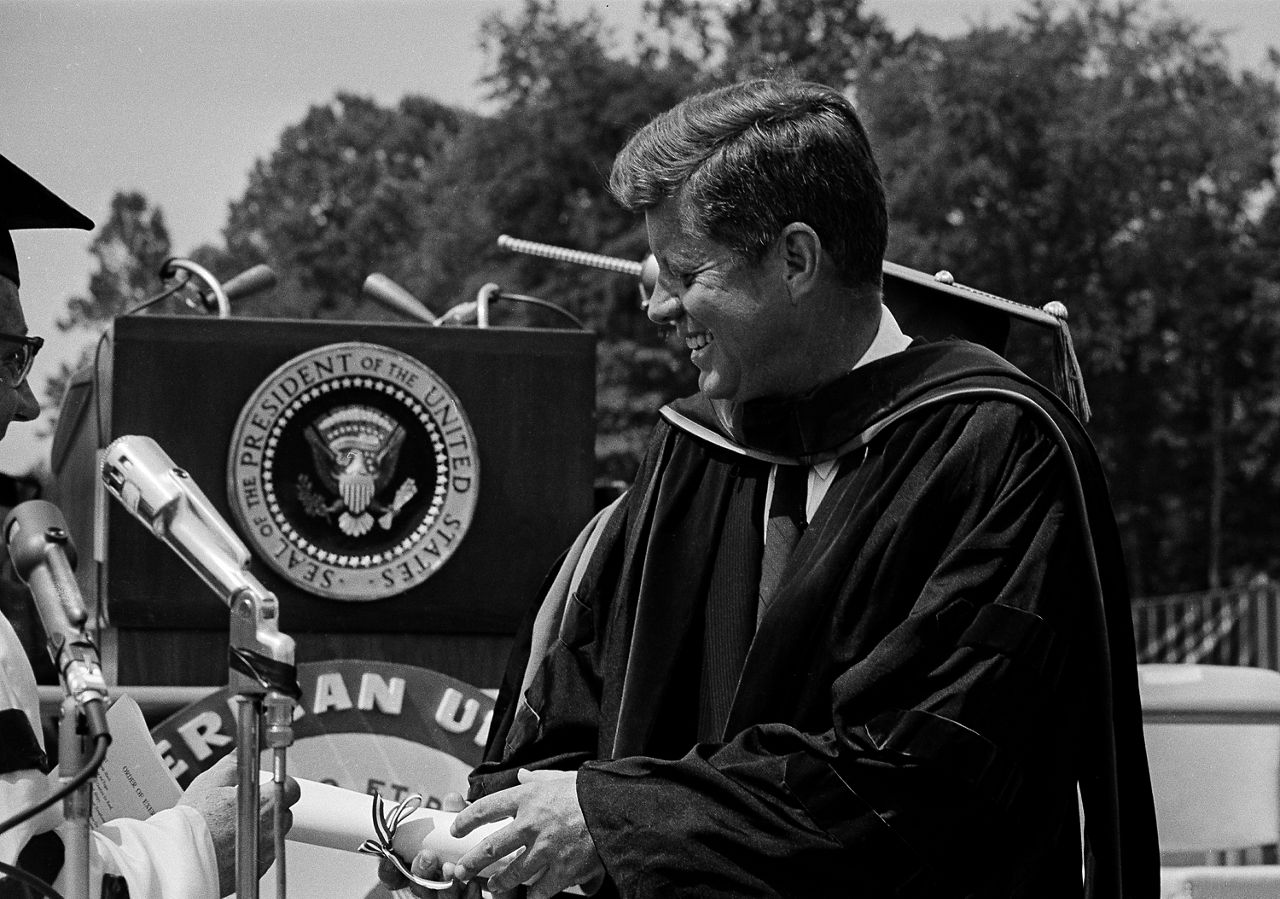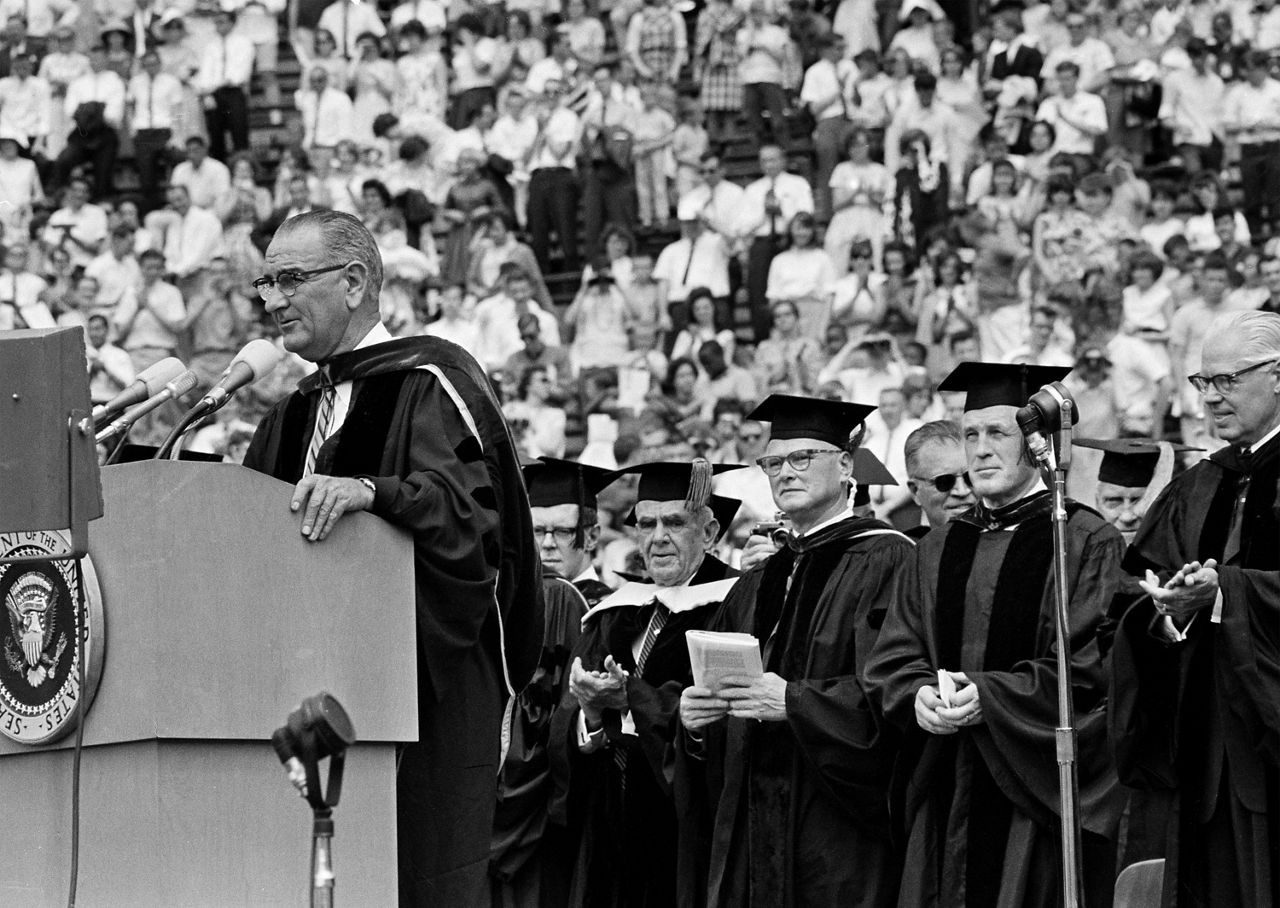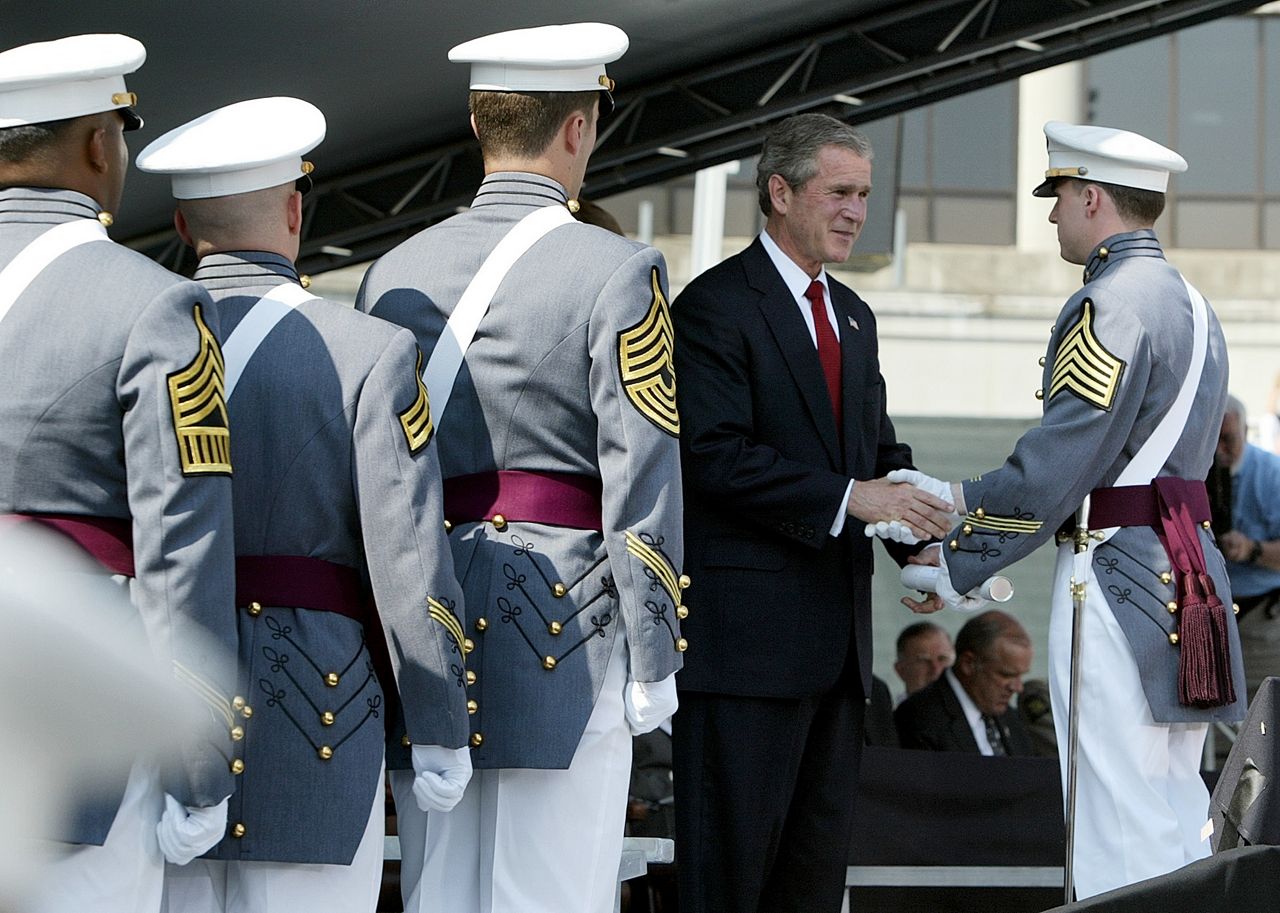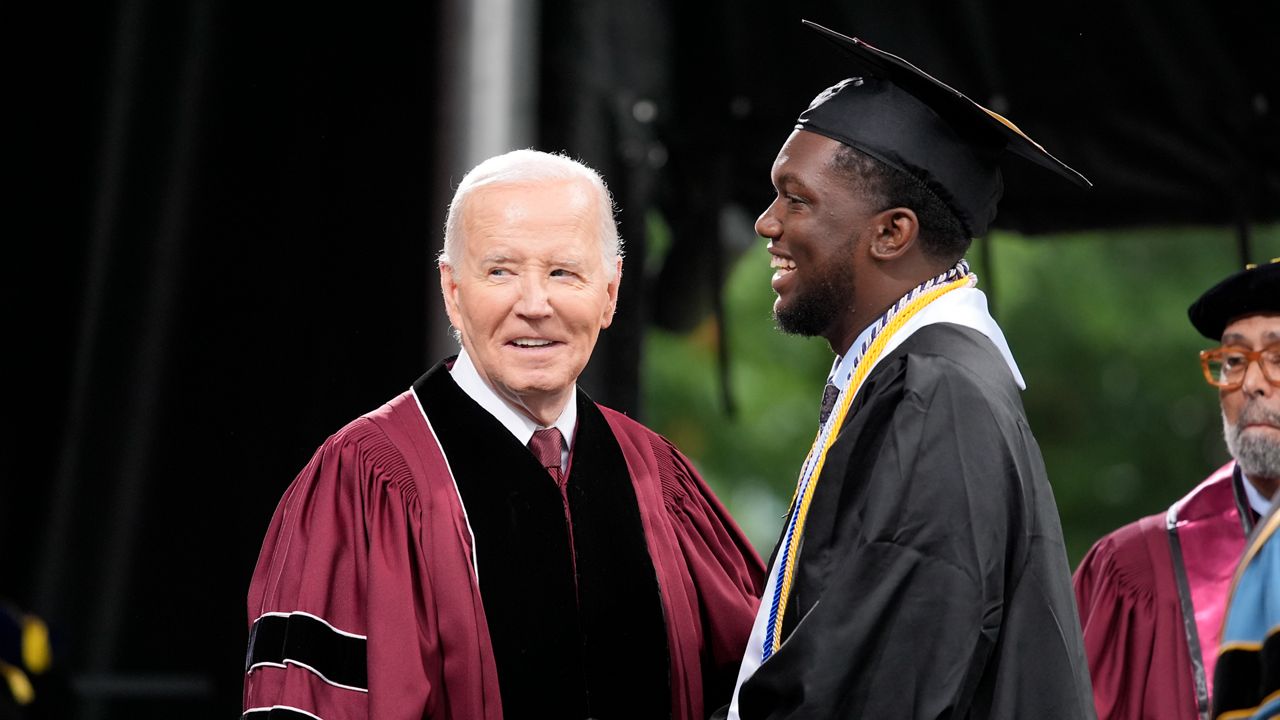When President Joe Biden delivers his commencement address at the U.S. Military Academy at West Point on Saturday, it will be part of a long-standing tradition of presidents speaking at graduation ceremonies.
Since 1902, nearly 200 presidential commencement speeches have been delivered, and every president since Dwight Eisenhower has given at least one such speech.
According to a database maintained by the American Presidency Project at the University of California, Santa Barbara, the first president to give a commencement speech was Theodore Roosevelt.
Professor Emeritus John Woolley, co-director of the American Presidency Project, said Roosevelt took a serious approach in the speech and highlighted the role of the United States in the world.
“Most of the time for presidents, giving a commencement address is an opportunity to have a pleasant interaction with a very appreciative audience,” Woolley said.
President Barack Obama has given the most commencement speeches, 26 during his eight years in office. After this year, President Joe Biden and former President Donald Trump will have each given seven.
Presidents have typically taken to the podium to highlight policy perspectives while seeking to connect with young voters, which have led to some memorable speeches.
President John F. Kennedy delivered a speech at American University in 1963, where he laid out a new approach to the Cold War. Titled "A Strategy of Peace," Kennedy called for nuclear disarmament and pledged that the U.S. "will never start a war."

"We do not want a war," Kennedy said. "We do not now expect a war. This generation of Americans has already had enough, more than enough, of war and hate and oppression. We shall be prepared if others wish it. We shall be alert to try to stop it. But we shall also do our part to build a world of peace where the weak are safe and the strong are just. We are not helpless before that task or hopeless of its success. Confident and unafraid, we labor on, not toward a strategy of annihilation but toward a strategy of peace."
Professor Allan Lichtman, who teaches at American University, called it the most significant commencement speech in U.S. history.
“That speech was an important prelude to the negotiation of the most important treaty in the history of the world, the Nuclear Test Ban Treaty,” Lichtman said. “It's the reason you and I are still around today; it's the treaty that stopped us from poisoning our atmosphere, our oceans and our soil.”
A year later, President Lyndon Johnson delivered the “Great Society” speech at the University of Michigan, which came to represent his domestic policy agenda -- which aimed to eliminate racial injustice and eradicate poverty.

Johnson told the graduates that "your generation has been appointed by history to deal with those problems and to lead America toward a new age" and challenged them to "help build a society where the demands of morality, and the needs of the spirit, can be realized in the life of the Nation."
"So, will you join in the battle to give every citizen the full equality which God enjoins and the law requires, whatever his belief, or race, or the color of his skin?" he asked. "Will you join in the battle to give every citizen an escape from the crushing weight of poverty? Will you join in the battle to make it possible for all nations to live in enduring peace--as neighbors and not as mortal enemies ? Will you join in the battle to build the Great Society, to prove that our material progress is only the foundation on which we will build a richer life of mind and spirit?"
There are those timid souls who say this battle cannot be won; that we are condemned to a soulless wealth," Johnson continued. "I do not agree. We have the power to shape the civilization that we want. But we need your will, your labor, your hearts, if we are to build that kind of society."

President George W. Bush spoke at the United States Military Academy at West Point, following the Sept. 11, 2001, terror attacks. During the speech, he explained his rationale for the U.S. involvement in Iraq, and his justification for a preemptive war.
"History has also issued its call to your generation," Bush said in the 2002 address. "In your last year, America was attacked by a ruthless and resourceful enemy. You graduate from this Academy in a time of war, taking your place in an American military that is powerful and is honorable."
"Our war on terror is only begun, but in Afghanistan it was begun well," he continued, later adding: "This war will take many turns we cannot predict. Yet I am certain of this: Wherever we carry it, the American flag will stand not only for our power, but for freedom. Our nation's cause has always been larger than our nation's defense. We fight, as we always fight, for a just peace, a peace that favors human liberty. We will defend the peace against threats from terrorists and tyrants. We will preserve the peace by building good relations among the great powers. And we will extend the peace by encouraging free and open societies on every continent."
There have also been a fair share controversial commencement speeches. President William Howard Taft gave one of the earliest recorded commencement speeches, before graduates at Howard University in Washington, D.C.
In his speech, which made numerous references to race and race relations, Taft called the historically Black research university "the partial repayment of a debt — only partial — to a race to which a government and the people of the United States are eternally indebted."
Woolley believes that the speech likely wouldn’t have been popular with graduates today.
“The thing that is particularly striking about that speech is how kind of offensive and condescending it is, from the perspective of 21st century views about race relations,” he said.
Woolley also highlighted another unusual speech, in which President Franklin Delano Roosevelt secured a last-minute invitation to speak before a high school graduating class in West Virginia. During the speech, he explained his position on a tax bill, which he did not veto but also did not sign.
“Imagine going to a high school graduation of any sort of high school, and have a long, complicated policy discourse about what's wrong with a piece of legislation,” Woolley said.
President Biden gave a speech earlier this month at Morehouse College, where he spoke at length about the war between Israel and Hamas, calling the situation in Gaza “heartbreaking.”
“I’ve called for an immediate cease-fire, an immediate cease-fire to stop the fighting and bring the hostages home,” Biden said. “And I’ve been working on a deal as we speak, working around the clock to lead an international effort to get more aid into Gaza, rebuild Gaza.”

He also spoke about the value of democracy, directly addressing the graduates of the historically Black college.
“We know Black men are going to help us, lead us to the future. Black men from this class, in this university,” Biden said.
Lichtman said Biden likely gave the speech as part of a broader effort to explain his policy decisions to Black voters.
“I think he decides to speak at schools where he'll have real impact, and the speech will disseminate beyond the school,” Lichtman said. “You can see Biden’s speech in his election year, very much is geared towards shoring up his standing among young people and African American voters.”
Almost exactly a quarter of presidential commencement speeches in the University of California, Santa Barbara database have been given during election years. Woolley views it as evidence that the speeches don’t tremendously help candidates, but don’t hurt them either. He says presidents typically give commencement speeches to show they can relate to the younger generation.
"That may be hard,” Woolley says. “It may be hard in the current era when the age gap between the candidates and the graduating classes are so tremendous.”


